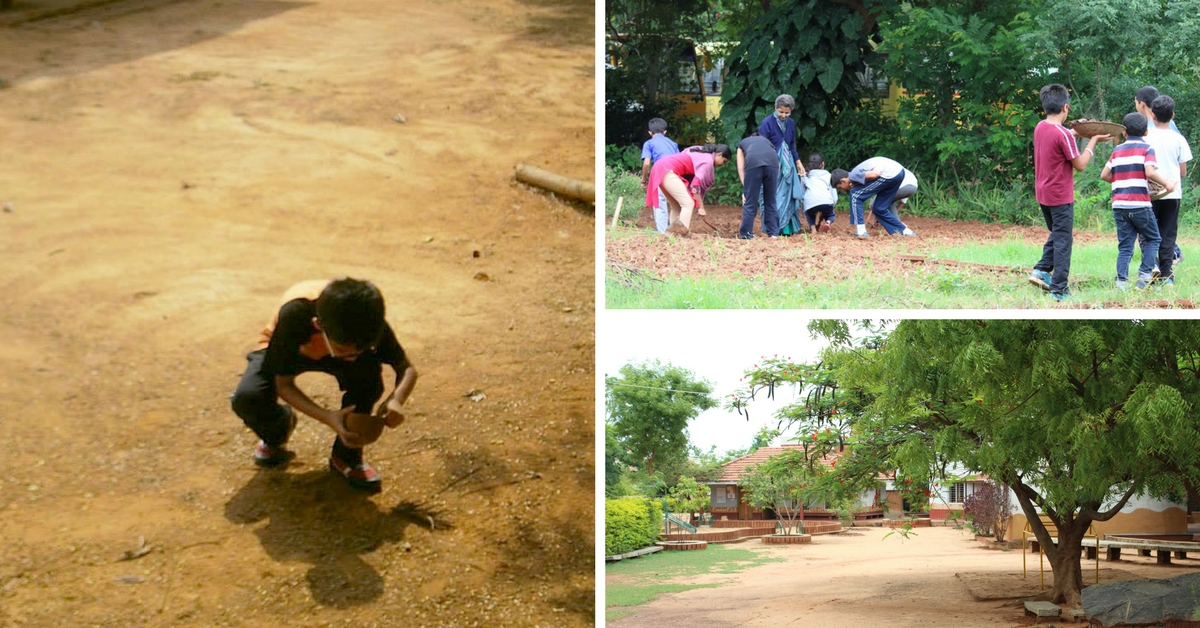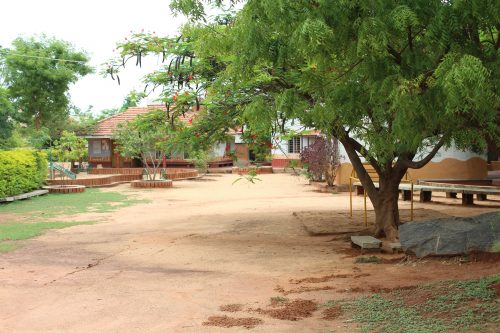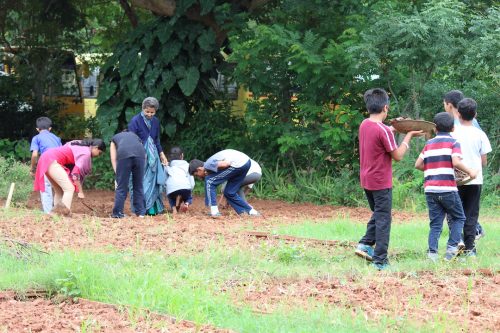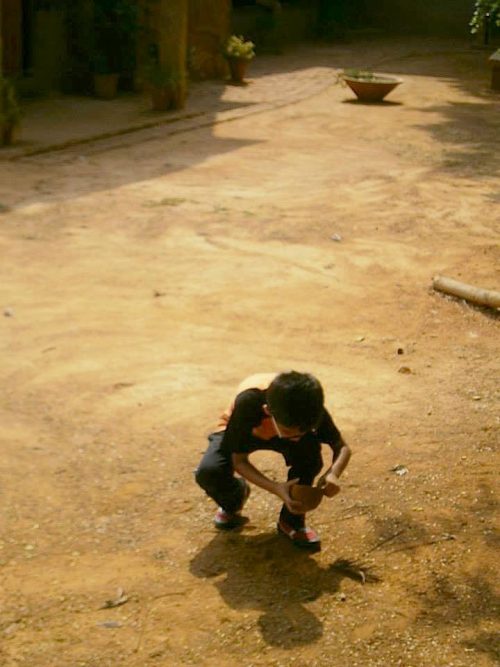TBI Blogs: A Unique School in Bangalore Takes Lessons From Nature to Provide Holistic Education to Students
Too many schools focus on academic learning while ignoring other aspects of education that are equally important in a child’s development. Seetha Ananthasivan talks about a school in Bangalore that is attempting to make its students’ education more holistic and in-tune with the lessons from Mother Nature.

Too many schools focus on academic learning while ignoring other aspects of education that are equally important in a child’s development. Seetha Ananthasivan talks about a school in Bangalore that is attempting to make its students’ education more holistic and in-tune with the lessons from Mother Nature.
How do we build a culture in a school that nurtures reverence for Mother Earth? Apply principles of Nature to the way we work with ourselves and our communities? How can we create a curriculum, and processes of learning, that can be integrated with the board exams that become essential to function as a school?
These are the questions with which Prakriya Green Wisdom School began its journey over 15 years ago. The school has gradually come to be known for its commitment to striving for ecological wisdom and living out its beliefs, keeping in mind the Nature within as well as around us, that we are all a part of. Prakriya is a Sanskrit word meaning prakruti + kriya, or acting according to Nature’s principles; Prakriya also means ‘process’. Hence, Prakriya’s very name spells out its chosen direction.
The foundational belief has been that Nature is the best teacher. Reminding ourselves every now and then about the miracle of Nature, Mother Earth, and the whole Universe can, I think, make us happier and more capable of solving our various “problems” than anything else. Reminding ourselves that we are part and parcel of Nature seems even more difficult; yet truth will prevail, so we might as well remind ourselves of this reality as well.
We found eight acres of land, with Eucalyptus plantations on it, close to a small lake (which did have water in it then). After clearing the eucalyptus, the first thing we did was to plant over 108 species of trees.
The nursery area in the front is the most beautiful space in Prakriya, with the energy of the youngest ones of the community making the whole school vibrant. The buildings are like small homes, classes named after the trees which have been planted in this space – Ashoka, Champa Chameli, Arjuna, Krishna – surrounding the sand pit in the middle.
On one end of the space is the Panchavati, with a semi-circle of the sacred trees – the pipal, banyan, bilwa, amla, and atthi (fig) – amongst various other trees and rocks.

Buildings are simple and down-to-earth, but have plenty of interesting lobbies and corners. We used a basic design principle, that no building should be taller than the tallest tree nearby.
Another eco-building principle was to source all building material from within a 500 km. distance. All buildings therefore use stones and tiles available in plenty near Bangalore, and clay tiles and blocks from Mangalore. Harmonizing with Nature in design can happen only when design elements emerge from basics of the landscape, the water availability, the soil, and the plants that can grow on it.
We also had to have our mini forest, however small, and we planted all kinds of wild species, from wild jamun and amla to bauhinias and kadu badam, in one corner of the campus. We call this space our “Devar Kadu”, to honour the sacred groves of India and the wise traditions that fostered them. A small orchard and an organic garden managed by Bhoomi Network, our research wing, provides vegetables and fruits to the school kitchen.
Rain water is harvested from all the terraces, and the black water from the kitchen is recycled and sent to the organic garden. We ensured there were no flush tanks in most toilets. Pouring in small buckets of water reduces the water consumption in toilets tremendously.
There were no butterflies on this land when we came in 16 years ago. We now have several species of butterflies, and over 30 species of birds, in addition to the snakes, frogs, bats, squirrels, and insects galore. Fireflies have emerged, giving a stamp of pristineness to this eco-system, and innumerable earthworms now live in our organic garden, which we are extremely grateful for!
Why give so much importance to the trees and plants around? Because that is what the children take in unconsciously, along with the ability to live with the complexity of Nature as against the straight lines and flat surfaces of the buildings (what is learnt unconsciously is more important that what is learnt consciously).
Simply put, unless children learn to live amidst greenery and love Nature, how can we expect them to care for Mother Earth?

The core philosophy is to build culture in the school which supports people in valuing and learning from Nature. Specifically, we can learn from the principles of ecosystems, the way they support diversity, the way all elements are interconnected, where constant cooperation and flow of energy and resources is the on-going reality of life. Self-regulation, death, and recycling have a deep acceptance in the school’s culture and philosophy. All these have lessons for us, and we keep trying to learn more.
Briefly, these are some of our first principles and processes that help us co-hold our philosophy of living and learning in an active and evolutionary way:
- We spend a lot of time in ‘Circle Time’, including children, teachers, as well as other staff in various groups. Discussions, problem solving, celebration, and often classes, are held in circles, where every member is important, and everyone has a voice. This process, we believe, is an essential part of building community where there is constant sharing, as in an eco-system. Interaction without authoritarian control will also enrich relationships all round. However, we also allow the reality of non-oppressive authority, essential in a system with about 600 children and more than 100 adults.
- Diversity is cherished, in flora and fauna as well as in human qualities and behaviour. Uniformity is not a requirement, as in most schools. Teachers do not force all children to ‘reach’ the same benchmarks; instead we encourage them to foster their strengths as much as possible. Children do not wear uniforms, but only house T-shirts, twice a week.
- Co-operation is very important as it is in nature, between teachers, children, and other members of the school. We design many activities to encourage everyone to value co-operation. Competition may play out, but we do not fuel or celebrate it. There are no cups and medals for sports or anything else.
The focus is Shram, Shraddha, Shakthi and Santhrupthi.

- Collaboration is another important value, particularly within the school. We also try to link up with nearby schools and invite educators, musicians, artists, and others to come into our world, for us to experience them as people and also learn from them.
- All teachers and administrative staff attend highly participative self-exploration sessions in 4-6 day retreats. These sessions help us put eco-psychology in action in classes, in school management, and in our personal lives too. These processes help us make the phrase “everything is connected” a living and lived-out reality. They also help “self-regulate” at various levels, an important principle of Nature that helps us solve most problems!
- The curriculum’s has mixed-age-group classes and learning through the five elements for the younger ones – an integrated approach. Active learning, critical thinking, and project-based working are part of the middle- and high-school curriculum. This is in addition to textbook-based work, which is essential for the ICSE. Organic gardening, the kitchen, craft work, and field trips are important for the “learning and living” processes as well.
Learning from Nature is an endless process. We must consciously build a culture in our schools which values Nature. Otherwise, we may end up succumbing to the prevailing culture in our societies, which sadly is anti-Nature.
(The author has a deep interest in understanding how we can build communities which are coherent with Nature’s principles. She is passionate about the development of eco-psychology as well as organic food and farming. Founder-Trustee of the Bhoomi College, she is Founder-Director of Prakriya Green Wisdom School and Bhoomi Network. She is also Editor of the Eternal Bhoomi Magazine.)
Find out more about Prakriya Green Wisdom School and its efforts to reconnect future generations with Nature, on its website.
Like this story? Or have something to share? Write to us: [email protected], or connect with us on Facebook and Twitter.
NEW: Click here to get positive news on WhatsApp!
This story made me
- 97
- 121
- 89
- 167
Tell Us More
We bring stories straight from the heart of India, to inspire millions and create a wave of impact. Our positive movement is growing bigger everyday, and we would love for you to join it.
Please contribute whatever you can, every little penny helps our team in bringing you more stories that support dreams and spread hope.



















